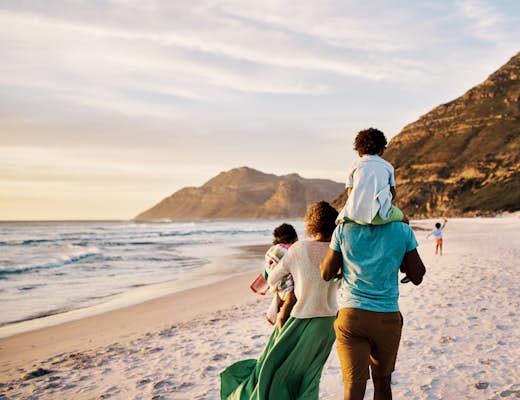
South Africa has something for every kind of traveler.
From dynamic Cape Town and the cosmopolitan vibes of Johannesburg to wildlife-filled expanses of wilderness such as the Kalahari and the Drakensberg mountains, the best time to come will depend on where you want to go and what you want to do when you get there.
In general, the climate in South Africa is warmer in the north and cooler in the south. You’ll also find different weather on the coasts compared to the elevated plateau that makes up most of the country, where it tends to be drier. Usually, the Indian Ocean coast feels more tropical, while the weather on the Atlantic coast is milder, though cold fogs and hot desert winds can still roll in.
Cape Town and the Western Cape are unique, weather-wise, having their rainy season in the winter (June to August). In the rest of the country, the rains arrive in the southern hemisphere summer (November through March), but the deluges rarely last for long (and there’s the chance of a photogenic thunderstorm). For many visitors, the weather is less of a factor than South Africa’s vibrant festivals and the annual migrations and breeding seasons for the country’s diverse wildlife populations. Whatever draws you to South Africa, here’s a guide to the best times to come.
Get the inside scoop on the latest cultural happenings all over the world delivered weekly to your inbox with our email newsletter.  Tons of festivals take place during South Africa’s warm peak season © Gallo Images / Getty Images
Tons of festivals take place during South Africa’s warm peak season © Gallo Images / Getty Images
The high season months (November to March) are full of festivals
November to March is summertime in South Africa, with daytime highs reaching 32°C (90°F), often with quite a lot of humidity. If you’re looking to visit during this peak season, you’ll need to plan ahead. Accommodations in coastal areas and national parks can book up months in advance, and popular vacation spots see accommodation prices rise by 50% or more.
That said, if you have the budget to travel in the high season, you can enjoy a host of festivals and events. AFROPUNK, a massive international multi-day music festival that draws artists from all over the world, kicks off in December. Held annually on January 2, the Cape Town Minstrel Carnival (known locally as Kaapse Klopse) is a high-spirited street parade dating from the mid-1800s with important links to overcoming apartheid and South Africa’s long history of slavery.
Cape Town’s Pride Festival is held in late February or early March, followed by the Cape Town Cycle Tour, which brings in cycling enthusiasts from all over the globe. March also sees the Cape Town International Jazz Festival and Klein Karoo Nasionale Kunstefees, one of South Africa’s largest arts festivals, held at Oudtshoorn in the Western Cape.
April, May, September and October mean lower prices and great wildlife watching
South Africa’s shoulder seasons see smaller crowds and several important festivals — including April’s Splashy Fen Music Festival in Durban. The big lure in the fall is wildlife-watching, as the tail end of the dry summer weather brings wildlife out into the open. The spring months of September and October bring the best chances of cetacean encounters. Wildflower season peaks in late August in the north and early September in the south, but blooms can appear from July depending on the rains and continue into October if it’s not too hot.
Low season (June to August) is the best time for budget travelers
The South African winter from June to August brings lower prices (except for safaris) and smaller crowds. This is the rainy season in Cape Town and the Western Cape (with Cape Town restaurants often offering pocket-friendly winter specials), but there’s still plenty of sunshine around. Elsewhere in the country, winters are much drier, and conditions are ideal for a safari (be prepared, though, for chilly nights and cold early morning game drives). Top winter festivals include the National Arts Festival in the Eastern Cape and Knysna’s 10-day Oyster Festival in July.
Want some help? Let Elsewhere plan your next trip.
 The winter is the best time for wildlife encounters, but animals can be spotted year-round © moodboard / Getty Images
The winter is the best time for wildlife encounters, but animals can be spotted year-round © moodboard / Getty Images
South Africa’s game reserves are best in the winter months
Rain will most likely interfere with your travels if you’re on safari. Northern game reserves such as Kruger National Park are driest from May to September, during the South African winter. While you might not have the lush backgrounds to your photos that you would in the spring and summer, wildlife is often easier to spot because the vegetation dies back and animals congregate around water holes.
The chilly winter nights also mean fewer mosquitoes, but you’ll need to bring layers to keep you warm during dawn game drives. For safaris in the Western Cape, the summer months are drier but coincide with the busy Christmas period and South Africa’s summer school holidays.
Peak whale-watching is in September and October
Though whales and dolphins can be seen year-round off South Africa’s southern and eastern coasts, September and October are the peak cetacean-spotting months. Between June and November, southern right whales and humpbacks migrate to and from Antarctica to breed and have their babies in the warmer waters off Mozambique and Madagascar. May to June also sees a massive run of sardines that attracts whales, dolphins, sharks and sea birds (Durban is an excellent base to watch the spectacle).
While you’ll see more from a whale-watching boat, whales often come close enough to the shore to be spotted from land. This is particularly so near the town of Hermanus, celebrated by the World Wildlife Fund as one of the world’s top whale-watching destinations, where whales can be seen as early as April. Gqeberha (formerly Port Elizabeth or PE) on the Eastern Cape is known as the world bottlenose dolphin capital, and pods are frequently seen between January and June.
 The rainy season in Cape Town and the Western Cape creates some impressive waterfalls © Franz Aberham / Getty Images
The rainy season in Cape Town and the Western Cape creates some impressive waterfalls © Franz Aberham / Getty Images
January is vacation time for local schools
On either side of the New Year celebrations, South Africans descend on tourist areas, including the coast and national parks, for the summer school holidays (early December to mid-January). Book accommodations and transport far in advance. The peak season for accommodations is November to March.
Key events: Cape Town Minstrel Carnival (Kaapse Klopse).
February has hot weather
Summer continues through February, with hot weather, crowds basking happily on the southern beaches and, thanks to its subtropical climate and high elevation, dramatic lightning storms in Jo’burg. For something a little different, there’s the four-day Up the Creek Festival (tbc for 2023) in Swellendam in the Western Cape, where you can float along the Breede River while bands play on the river’s banks.
Key events: Hands-on-Harvest, Up the Creek Festival, Ultra South Africa, Cape Town Pride Week.
March is suitable for hikers
The summer rolls toward fall, but days are still sunny in the Cape. The Lowveld (open grassland and woodland areas between 150m and 610m above sea level) is steamy and warm, and the landscapes are lush and green; the Highveld, at a higher altitude, is slightly cooler. This time of year is especially good for walking and beach bumming in the Western Cape. Cultural and music festivals happen in Cape Town and Jo’burg.
Key events: Cape Town Cycle Tour, Cape Town International Jazz Festival, Klein Karoo Nasionale Kunstefees.
April marks the end of the rainy season
There’s a two-week school vacation around Easter, generally regarded as the beginning of the short fall season; accommodations need to be booked well in advance. Days are still warm, and nights begin to cool. Much of South Africa sees the end of the rainy season, with rivers full and flora lush. Though you can still lie on the beach, the drier weather makes wildlife-watching in the bushveld a more attractive option. The rutting season for impala — one of South Africa’s most abundant antelopes — begins in April, with displays of dominance (like the clashing of horns) increasing as the days get shorter.
Key event: AfrikaBurn.
 The months immediately after the rains are a great time for trekking in the Drakensberg mountains © Gallo Images / Getty Images
The months immediately after the rains are a great time for trekking in the Drakensberg mountains © Gallo Images / Getty Images
May is the first official month of winter
Nighttime temperatures drop, and tourism slows down in May. It’s still beach weather in Durban and along the KwaZulu-Natal coast, but snow may fall in the highlands. The end of the rains in most parts of the country means safari conditions start to improve.
Key event: Franschhoek Literary Festival.
June’s temperatures are cooler across the country
Winter brings cooling temperatures and – especially in Cape Town and the Western Cape – a good chance of rain. June is the coldest month in Johannesburg, with daytime temperatures around 16°C (60°F), falling to about 4°C (40°F) at night. Don’t let that put you off: safari conditions are still great in the dry north.
Key event: National Arts Festival.
July is the middle of the low season
Winter brings rain to the Cape and clouds to Table Mountain (there’s even a chance you might get snow), but plenty of days will see some sunshine. Rougher winter seas make boat trips (even to Robben Island, the former political prison just off Cape Town) less pleasant, and trips may be canceled altogether during squalls.
Northern areas experience fresh, sunny days and clear night skies. Early winter mornings can be cold with temperatures close to freezing, but afternoon highs can creep up towards 18°C (65°F). This is the middle of the June to September low season (apart from the mid-June to mid-July school holidays), but winter is a great time for safaris.
Key events: Knysna Oyster Festival, J-Bay Open, Durban International Film Festival.
August is the best time to see wildflowers in bloom
Signs of spring are in the air in South Africa in August. Head to the west coast and the north to see wildflowers: mid-August to mid-September is usually the best time. Kruger National Park and the northern reserves remain pleasantly dry, and the soccer, rugby and cricket seasons typically begin in August.
Key event: Namakwa wildflowers.
September is an ideal time to spot whales
In September, the rainy season in the Western Cape eases off, and Jo’burg and the north often see their first big rains. Temperatures in Cape Town and Jo’burg are mild; cherry trees bloom in the south, and wildflowers reach their peak in mid-September. Safari parks remain a top draw, with many baby animals born in spring. School holidays run from late September to early October, increasing demand for accommodations. It’s also a good time for whale-watching at Hermanus.
Key events: Festival of Motoring Johannesburg, Winelands Chocolate Festival, Hermanus Whale Festival.
 Join the crowds in South Africa and head to the beach as the weather warms up © Diriye Amey / 500px
Join the crowds in South Africa and head to the beach as the weather warms up © Diriye Amey / 500px
October is mostly sunny
October offers mostly sunny weather, but you’ll avoid the worst of the summer crowds and peak prices. Book accommodations in advance during the 10-day South African school holiday beginning in late September and stretching into early October. Whale-watching can be excellent at this time of year.
Key events: Macufe African Cultural Festival, Durban Bierfest.
November means more crowds and higher prices
As spring drifts into summer, it’s the peak time to see grassland wildflowers in the Drakensberg mountains and the end of whale season off the Cape. Free State’s Ficksburg, known as Cherry Town, has a cherry-centered festival during the third week of November.
The rain and humidity start to increase around Kruger and in KwaZulu-Natal. It’s no longer cold but not uncomfortably hot in the semi-arid desert of Karoo National Park, with highs around 27°C (80°F) and lows around 10°C (50℉). The high season begins in November, so expect higher prices and crowds.
Key events: Kirstenbosch Summer Sunset Concerts, Ficksburg Cherry Festival.
December is festival season
The hot, dry days pick up as the South African summer officially gets cooking in December. Music festival AFROPUNK in Johannesburg is the perfect big-time kickoff to the city’s music festival season, while Durban celebrates its street food scene and craft distilleries with the annual Street Food Festival.
Key events: AFROPUNK, Durban Street Food Festival.



